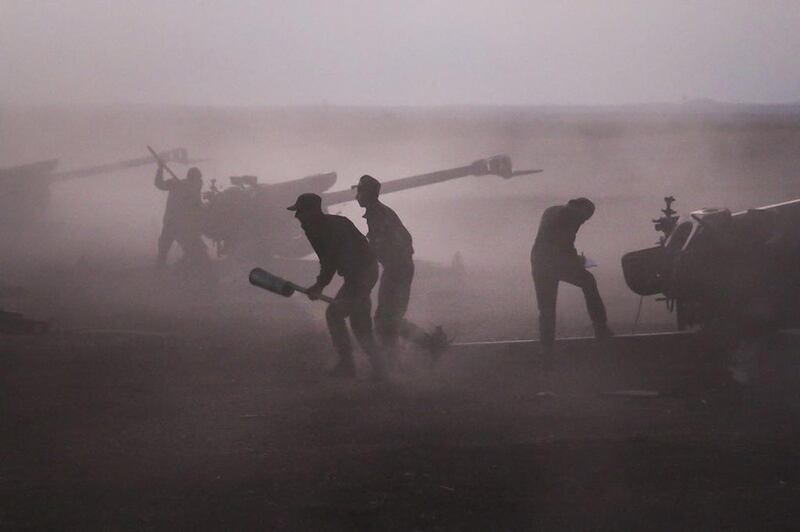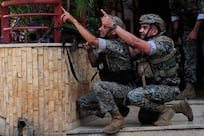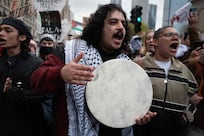Over the past seven years, several interventions by outside powers in the Syrian conflict were provoked by militias. The story of each of those interventions demonstrates the folly of making final judgements about the status of the war.
ISIL caused the United States to intervene in 2014, when the militants took over about one third of Iraq and half of Syria. Then came the Russian intervention a year after, caused by the string of surprising gains made by Jaish Al Fatah in northwestern Syria in the early months of 2015. Turkey entered the scene the following year, to halt the expansion of the Kurdish YPG.
These interventions were punctuated by frequent airstrikes by Israel against Shia militia targets near its borders, as it sought to intercept any hostile build-up by Iran and its allied militias there. Iran had inaugurated the foreign interventions when it dispatched “pilgrims”, “technical advisers” and then militias to bolster Bashar Al Assad’s regime since the early months of the violence.
Most of these interventions also defied earlier calculations by those countries involved. The US intervention came despite the former administration's aversion to military involvement in the country. This reluctance about deep involvement continued even after the campaign against ISIL started, as the operation initially had an Iraq-first strategy.
Also, just a year before the US-led intervention, Washington backed off from a decision to conduct punitive strikes against the regime for its use of chemical weapons against civilians. Instead, it reached a deal with Russia to terminate the Syrian chemical weapon arsenal. The deal was touted as a historic accomplishment, relieving the regime of its stockpiles. Washington also worked to convene peace talks in Vienna between the regime and the opposition, and the last weapons were shipped out of Syria for destruction in the same month that ISIL took over Mosul, in June 2014.
Russia had also hoped that division of labour with Iran to support the regime, by shielding it at the Security Council and shoring it internally since 2012, respectively, would suffice. But a militia alliance led by Jabhat Al Nusra and Ahrar Al Sham, and sponsored by Turkey and Qatar, forced Russian hands, when it had to deploy troops inside Syria in September 2015.
It was then Turkey's turn to make a 180-degree shift to its Syria policy a year after. Ankara had previously focused on the toppling of Bashar Al Assad, and privately argued that his removal should take precedent over the defeating of extremists since the latter could be dealt with after that. But it made an about-face in August 2016, when it began Operation Euphrates Shield to create a zone that would preempt the Kurdish expansion and isolate their enclaves in northeast Syria from those in the north west.
_______________
Read more from Opinion
[ The cities of the future might be dominated by robots ]
[ How to win friends and influence people, the Soros way ]
_______________
Ironically, Turkish support for Jaish Al Fatah had a key role in bringing Russian troops to Syria, while Russia’s presence later facilitated the Turkish intervention in Jarablous and lately in Afrin. Turkey then turned from the most dedicated sponsor of the rebels to, arguably, the greatest enabler of the Russian strategy, since the duo worked closely, along with Iran, to redraw the political and military map of the country, especially in the north.
Another irony is that the US, once vehemently opposed to involvement in Syria, now occupies one-third of the country. The American presence today is based on valid premises, notably the need to ensure that jihadis are properly defeated and do not return. But its presence comes at the backdrop of two other interventions, by Russia and Turkey, which further complicate the situation for the US.
In other words, Washington’s previous attempts to stay away failed, and the reality of the Syrian conflict forced it to intervene but in a more complicated environment. Instead of saving itself a headache, it paid a double price — an outcome befitting of the Arabic proverb “a stingy person ends up buying his lunch twice”.
Miscalculations and attempts to avoid doing what was necessary raised the costs for all those countries. The conflict can still cause new unforeseen scenarios in spite of recent assessments that the war was winding down and that Russia had finally set the trajectory of the situation in Syria in favour of its ally in Damascus. The Syrian army still suffers from the same problems that Mr Al Assad himself acknowledged about a month before the Russian intervention, when he said the army had a manpower shortage.
The serial quick defeats it suffered in early 2015 reflected brittleness that has only marginally addressed. Shortage in manpower has been compensated for by foreign militias or auxiliary forces directly supervised by Russia and Iran, which have led much of the fighting against its opponents in recent months.
But the increased role of these militias is inviting new conflicts in the country, as demonstrated in recent days. American strikes killed nearly 100 pro-regime forces, including around a dozen Russian mercenaries, after they attempted to attack the US-backed Syrian Democratic Forces in Deir Ezzor. Two days later, Israel conducted a round of strikes against Iran-linked bases and militias in central and southern Syria.
Rather than settling the situation in favour of Mr Al Assad, Russia and its allies are dancing a delicate dance in the country. Calmed frontlines have enabled the regime to move forces around the country. But no effort could strengthen the Syrian army to conduct large-scale operations that would enable it to take over significant territory in the foreseeable future.
The result seems to be a continuing status quo at least superficially. Beneath the surface, though, lies endless possibilities of miscalculation and future vulnerabilities, including to those opposed to the regime, as we have seen repeatedly over the past seven years.





